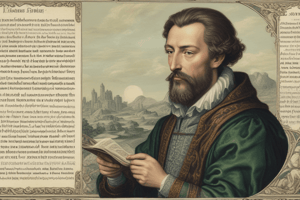Podcast
Questions and Answers
Who wrote the ode Epithalamion and when was it written?
Who wrote the ode Epithalamion and when was it written?
Edmund Spenser wrote the ode Epithalamion to his bride, Elizabeth Boyle, on their wedding day in 1594.
What is the volume in which Epithalamion was first published and by whom?
What is the volume in which Epithalamion was first published and by whom?
Epithalamion was first published in 1595 in London by William Ponsonby as part of a volume entitled Amoretti and Epithalamion.
How many complete copies of the first edition of Epithalamion remain today?
How many complete copies of the first edition of Epithalamion remain today?
Only six complete copies of the first edition of Epithalamion remain today, including one at the Folger Shakespeare Library and one at the Bodleian Library.
What does the ode's content represent in terms of time and what does it progress from and to?
What does the ode's content represent in terms of time and what does it progress from and to?
When did Edmund Spenser live?
When did Edmund Spenser live?
Flashcards
Epithalamion author
Epithalamion author
Edmund Spenser wrote the poem Epithalamion.
Epithalamion publication year
Epithalamion publication year
It was published in 1595.
Epithalamion's volume
Epithalamion's volume
First published in Amoretti and Epithalamion.
Epithalamion's theme
Epithalamion's theme
Signup and view all the flashcards
Spenser's lifespan
Spenser's lifespan
Signup and view all the flashcards
Study Notes
Edmund Spenser's Epithalamion
- The ode Epithalamion was written by Edmund Spenser.
- Epithalamion was first published in the volume "Amoretti and Epithalamion" in 1595 by William Ponsonbie.
Availability of First Edition
- Only three complete copies of the first edition of Epithalamion remain today.
Content and Structure
- The ode's content represents a 24-hour period, progressing from dawn to dusk.
- The poem progresses from morning to night, depicting the marriage of the narrator and his bride.
Edmund Spenser's Life
- Edmund Spenser lived from 1552 to 1599.
Studying That Suits You
Use AI to generate personalized quizzes and flashcards to suit your learning preferences.




